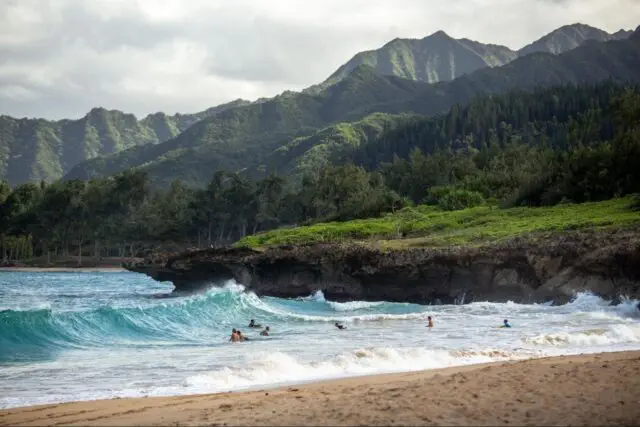Thousands of years ago, a restless, adventurous people left their homes in the Malay Peninsula and the Indonesian Archipelago. Undertaking one of the most courageous examples of seafaring in history, they sailed using double-hulled canoes, navigating only by the sun, currents, and stars. Over time, these voyagers migrated to islands across the Pacific. Today, we know their descendants as Pacific Islanders.
However, this title encompasses a broad spectrum. Separated by sea and mountains, innumerable micro-cultures formed, many with unique languages. Polynesians comprise the largest group, including Native Hawaiians, Samoans, Tahitians, and Tongans. Micronesians make up the second largest, primarily composed of Chamoru from Guam, but also including other Chamoru, Carolinian from the Northern Mariana Islands, Marshallese, Palauans, and other distinct communities.
So, given this rich diversity, shouldn’t we have been more specific? After all, it would be doing a disservice to these many cultures to attempt to amalgamate them. However, while this difference needs to be celebrated and preserved, there are notable similarities between them; namely, their respect, appreciation, and connection to nature.
What is Nature Immersion?
There’s little doubt that (as long as you’re not lost in the wild!) any time spent in nature is beneficial for you. There are dozens of studies concluding that green spaces and exercising in nature promote health and well-being. But what happens when we introduce presence into the mix? It’s true that, even if you’re thinking about tonight’s dinner, or ruminating on a current work project, you can still enjoy the benefits of a forest, mountain, or lake. However, being totally conscious of your surroundings—with no defined destination or headphones in your ears—allows you to fully tap into nature’s innumerable benefits.
Nature immersion is an invitation to attune your senses to the natural world. It provides the requisite stillness for wonder to bloom, nourishing your mind, body, and spirit. Today, there is incontrovertible evidence that this practice is hugely beneficial, with this 2020 study concluding:
“Based on the findings, the benefits of nature exposure are once again reinforced, even in buildings and parks incorporating biophilic built design features.”
One notable example of nature immersion is the Japanese practice of Shinrin-yoku, literally translating to “forest bath” or “taking in the forest atmosphere.” It involves immersing yourself in the restorative atmosphere of a forest and mindfully engaging with its sights, sounds, and scents. Shinrin-yoku has been found to offer numerous psychological and mental health benefits, such as reducing stress, boosting the immune system, and improving mood and cognitive function.
How to Practice Nature Immersion
For many people—especially those who suffer from addictions and mental health issues—meditation can be difficult. Many have to contend with racing and intrusive thoughts, nagging cravings, or certain deficiencies limiting focus. This is where nature exposure can help. Because it’s shown to reduce stress, slow heart rate, and produce calm, healthy alertness, a gateway to mindfulness is opened.
Practicing nature immersion is very straightforward. All you need do is find a quiet spot in a nearby wood, park, or even your own backyard. If you have access to the jaw-dropping beauty of a Hawaiian volcano or tropical rainforest, all the better!
Allow yourself to become fully present in the moment. Take slow, deep breaths to clear your mind and relax your body. Listen closely to the many sounds around you—the gentle rustling of leaves, the birdsong, the rushing of a waterfall or stream. Take in the smells, like the earthy scent of soil or the delicate fragrance of flowers. Allow the crisp air to fill your lungs, and observe the intricate patterns of your surroundings. Open yourself up to the harmony of nature. Reach out and touch the rough bark of a tree. Feel the sun’s warmth on your skin, the gentle breeze, the soft moss or smooth stones beneath your feet.
Remember, there’s no right or wrong way to practice nature immersion; the key is simply being present. Don’t judge yourself if your mind wanders and try not to identify with every thought— let them pass like clouds across the sky. This will help make you more receptive to the healing power of your surroundings.
Interestingly, the Hawaiian word, aloha, while considered just a greeting by most Westerners, literally translates to “the presence of breath,” or “the breath of life.” Maybe it’s time we paid more attention to the ancient wisdom of the Pacific Islanders.
Whenua, aina, and va—a Timeless Reverence for Nature
The indigenous peoples dotted throughout the Polynesian Triangle have been living in harmony with the land for millennia. The over 10,000 islands are home to some of the most beautiful and diverse nature on the planet—white beaches, towering mountains, active volcanoes, and, of course, the clear, blue waters of the Pacific.
Nature is extremely important to the myriad cultures that populate this area. They have maintained a respect and reverence for the land that’s fast diminishing in the West. Not only is this because their survival long required this symbiosis, but it’s also due to the strength of their values.
Despite the cultural violence enacted upon them by outside forces, these values are very much alive within the many different peoples. As shown in this video, new generations still honor their cultural identity. A close relationship with nature is core to this, and it’s no wonder Pacific Island leaders have been instrumental in shaping climate change policies.
The Maori
“As man disappears from sight, the land remains.”– Maori proverb
The Maori are the indigenous people of New Zealand. To emphasize their connection to specific regions of ancestral land, they often use the term “tangata whenua” (“people of the land”), even if they no longer reside in their ancestral village.
Central to Maori beliefs is the profound interrelationship between humans and the natural world. This connection is embodied in the concept of kaitiakitanga, an environmental management approach rooted in their worldview. It conveys that humans are equal, integral components of nature.
This deep bond with the land, along with their understanding of their inseparable role within it, instills in the Maori people a strong respect for nature, leading them to adopt practices that promote conservation and sustainable resource usage.
The Hawaiians
“Care for the streams, and you will live by the sea.”—Hawaiian proverb
Hawaiian culture is famous for its strong connection to the land and ocean (“aina” and “kai” respectively). This is rooted in their culture, traditions, and daily life. As they’ve long provided them with life and sustenance, they view the land and sea as sacred. This reverence for the environment is reflected in their language, which has over 200 words for different types of rain, wind, and ocean waves.
These joyous, welcoming people also prioritize environmental conservation, with numerous protected areas and sustainable agricultural practices. Furthermore, their cultural traditions (such as storytelling) teach emerging generations valuable lessons about their environment, thereby preserving a timeless respect for nature.
The Somoans
“The coconut tree doesn’t sway on its own, but is swayed in the wind.”—Somoan proverb
Samoan culture embodies the principle of fa’a Samoa, roughly meaning “the Samoan way.” This concept encapsulates Somoan’s traditional values, customs, and social organization. It also underscores a deep connection to the land. Essentially, Samoans view their environment as a source of both physical and spiritual sustenance—something transcending mere practicality.
Their concept of va is a fundamental aspect of their culture and worldview. It refers to the relationship and space between two entities, whether it be people, objects, or the environment. Va is often described as a dynamic and reciprocal relationship, where each entity depends on the other for balance and harmony.
Taking Stock of Ancient Wisdom
For the sake of concision, we’ve only given three examples, but there are dozens of other Polynesian cultures that share the same reverence for the natural world.
So what can we learn?
Well, seeking to understand and embrace these cultural practices helps us better appreciate our relationship with the environment; to feel the interconnectedness of all things, and develop a profound connection with the land. Not only can this provide inspiration for sustainable living and conservation efforts, but can help lay a solid foundation for nature immersion.
The great thing about nature is that it’s totally free. It’s usually just one step away, right outside your window, waiting for you to draw it in. If you’re suffering from an addiction, physical illness, or mental health condition, few practices are as beneficial or impactful. So shake off those cobwebs and step out into a sublime, meditative, healing world!
How Maui Recovery Can Help
We have a profound respect for Hawaiian culture, and share its reverence for the beautiful, healing environments of the islands. At Mauri Recovery, not only will you get to experience the luxury of our state-of-the-art facility, but you’ll also have the opportunity to explore transformative treatments like nature immersion and adventure therapy.
Our compassionate and experienced team will work with you to develop a fully personalized treatment plan. Through outdoor excursions, exciting activities, and immersive experiences, you’ll have the opportunity to rediscover your strengths, develop new coping skills, and nurture your spirit.
Ultimately, we believe in the power of nature to reveal the power within you.
To find out more about our treatment plans, and how we incorporate nature immersion, please feel free to contact us at any time.











